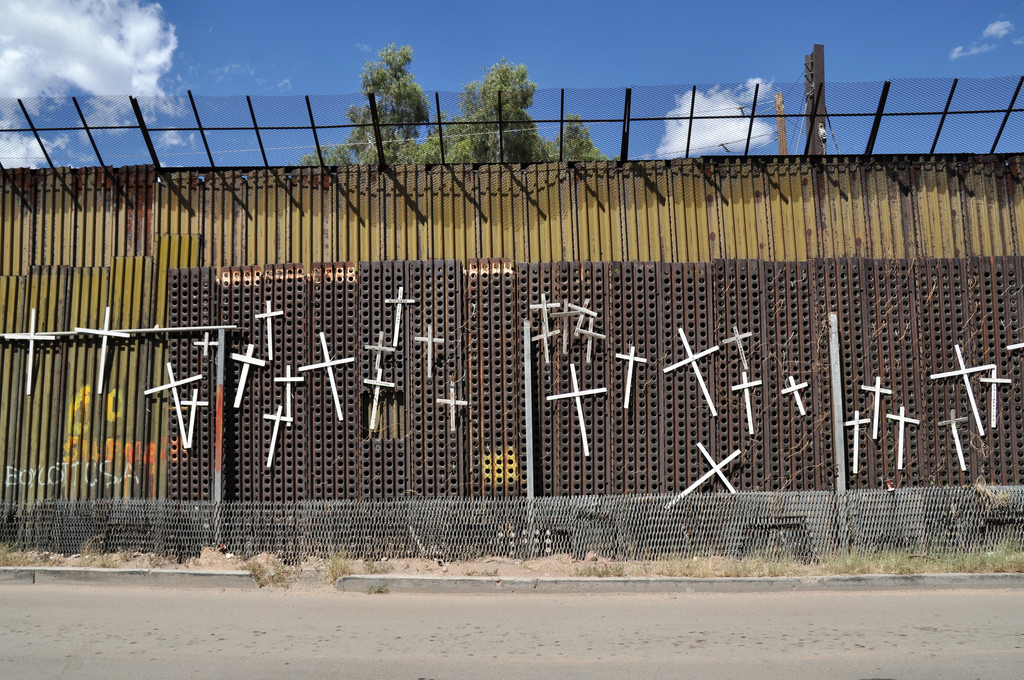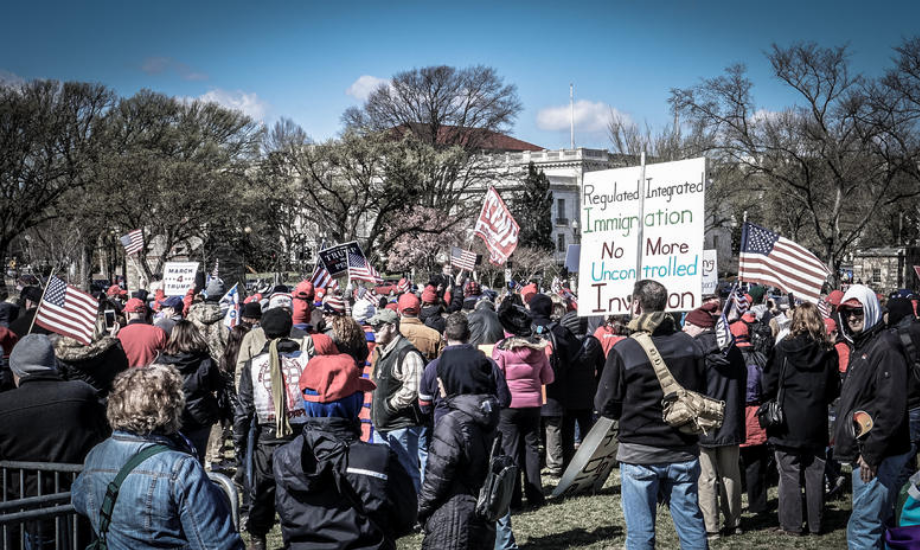
Trump’s Oval Office address glosses over the violence of America’s border security
Sahar Shah
30 Jan 2019
Image by Jonathan McIntosh/Creative Commons
In his first Oval Office primetime address earlier this month, Trump interrupted our evening television time to once again make his case for a border wall between the US and Mexico. He said a lot of things, and a remarkable number of them were factually inaccurate, considering the serious nature of the presidential Oval Office address.
The misleading nature of the “facts” presented in the speech have been taken to task by most major US news outlets. What has not been sufficiently questioned, however, is its implicit moral assumption that American lives are more important than others.
In the media response to Trump’s speech, we have heard extensive debate about whether or not people who have migrated across America’s southern border threaten American lives. Missing from the conversation is recognition of the ways in which America’s existing border security system threatens the lives of people who have migrated from Mexico. Since 2016, investigative reporter Sarah Stillman has been creating a record of people who have migrated from Mexico that have been “sent back to their deaths” through deportation by U.S. border officials emboldened by Trump’s indifferent stance towards migrant lives.
“Trump has an implicit moral assumption that American lives are more important than others”
In a groundbreaking piece for the New Yorker, Stillman follows the story of a Mexican woman called Laura who is stopped by a police officer for a minor traffic violation. After being unable to produce “satisfactory documentation”, Laura is referred to border security. She pleads with a border official for her life, but it is in vain – the very next morning, she is made to cross the border on foot. In the moments before she was crossed the McAllen-Hidalgo International Bridge back into Mexico, she told the agent “When I am found dead, it will be on your conscience.” She was indeed found dead in her hometown not long after.
Her friend, when asked what she would say to President Trump if given the chance, said “Please be conscious of what happens when a woman gets deported. It’s not only what could happen to her –it’s the [kids] she leaves behind, in America.” Cristina Novoa, writing for NBC News reminds us that Trump’s “border crisis” really consists of “a seemingly endless parade of policies that would harm children: separating children from their parents, family incarceration and cruel treatment by border security”.
When we hear the term “safer than ever before” (a promise issued in Trump’s address), it’s crucial to consider that many of the same factors influencing crime in Mexico also keep crime alive and well in the United States.
Crime does not exist in a vacuum – it is often a result of desperation and hopelessness, both of which are available in abundant supply in the United States regardless of border security. It’s vital that we talk about poverty, inequality, racism, and disenfranchisement with the same level of fervour that we talk about its consequences.
“The illusion of criminality as characteristic of specific groups continues to be used as a strategy to dehumanise people”
The illusion of criminality as inherently characteristic of specific groups – largely marginalised communities of colour – continues to be used as a strategy to dehumanise people, as brilliantly shown in Ava DuVernay’s award-winning documentary, 13th. Illusions like these allow Trump to “manufacture crises” out of immigrants seeking refuge, as member of the US congress Alexandria Ocasio-Cortez says.
“Some have suggested that a barrier is immoral,” Trump said in his address. “Then why do wealthy politicians build walls and fences and gates around their homes? They don’t build walls because they hate the people on the outside, but because they love the people on the inside.” Yes, the rich in America build walls around their houses. This isn’t a harmless thing – it’s a stark marker of structural inequality. The walls aren’t built purely out of love for the people inside – they are a symbol that the society they are profiting from is irrational. We have been warned by economists that if we let inequality continue to grow, we’ll soon live in neighbourhoods where even middle-class homes are surrounded by gates and security systems (which is already the case in areas of South Africa, for example). This isn’t a peaceful way to live, even for those within the gates (but particularly for those outside of them).
Inequality has pragmatic political consequences: a 2015 report by the Organisation for Economic Co-operation and Development (OECD) explains that “high levels of inequality may make it hard for societies to come to a political consensus, resulting in sudden policy shifts or governments serving the interests of their own supporters at the expense of the greater good”.
In the world that Trump envisions, there are only zero-sum games – winners and “losers”. But what if this vision runs contrary to what we most deeply crave as humans (i.e. connection, community, and collective prosperity)? “Make America Great Again” forgets (or perhaps condones) the devastation and destruction that empire-building entails and has always entailed.
“The injustices that force so many people to risk their lives travelling to the United States remain unaddressed”
“This is the cycle of human suffering that I am determined to end,” Trump says. But the catalyst of this “cycle of human suffering” is not migration. The wall changes nothing: Americans are still stuck in America with other Americans, living increasingly unsatisfying American lives, while the domestic injustices (fueled by global issues) that force so many people to risk their lives travelling to the United States remain unaddressed. Climate change, meanwhile, hangs over us, threatening to affect millions more people who will be forced to flee their homes in the coming years.
Human problems, or “crises of the soul” can’t be solved by concrete or steel slats. If the cycle of human suffering could be ended by the construction of a wall, someone would have sorted it out long ago. Inequality is infinitely complex, and we will need more involved discussions, including acknowledgement by the world’s richest countries of their legacies of violence and damage, to even begin to address it.
As Cornel West wrote in the Guardian last year: “Our last and only hope is prophetic fightback – a moral and spiritual awakening that puts a premium on courageous truth-telling and exemplary action by individuals and communities.” Until then, our policies (along with our political discourse) will remain superficial and reactionary.









